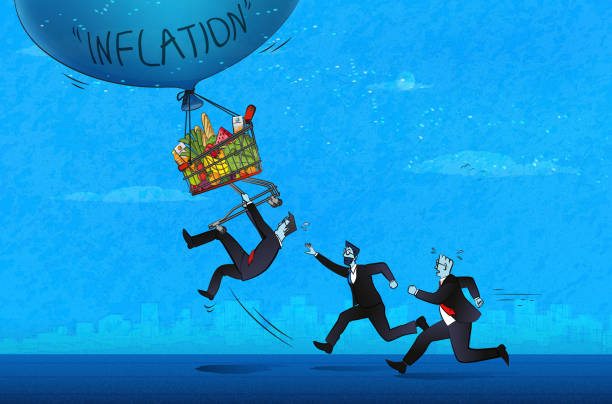Dive Deep into the Ocean of Financial Independence.
Introduction
Inflation is a term that frequently appears in economic news, policy discussions, and everyday conversations—especially when prices begin to rise. But what does inflation really mean? Why does it happen? And how does it impact you, your finances, and the economy at large?
In this in-depth guide, we will explore the concept of inflation, its causes, types, and real-world implications, helping you understand one of the most critical forces shaping economic systems around the globe.
What Is Inflation?
Inflation is the rate at which the general level of prices for goods and services rises over a period of time, leading to a decline in the purchasing power of money.
In simple terms, when inflation occurs, each unit of currency buys fewer goods and services than it did previously.
📌 Example:
If the inflation rate is 5%, something that cost ₹100 last year will cost ₹105 this year.
Why Is Inflation Important?
Inflation is a double-edged sword. A moderate level of inflation is a sign of a growing economy. But too much or too little inflation can cause economic problems:
- Moderate inflation can encourage consumption and investment.
- High inflation erodes purchasing power and savings.
- Deflation (negative inflation) can lead to decreased economic activity.
Central banks like the Reserve Bank of India (RBI) or the Federal Reserve aim to keep inflation at a target level, usually around 2% to 4% annually.
How Is Inflation Measured?
Inflation is usually measured using indexes that track the prices of a basket of goods and services over time.
Common Inflation Indicators:
- Consumer Price Index (CPI): Measures the average change in prices paid by consumers for goods and services.
- Wholesale Price Index (WPI): Measures price changes at the wholesale level.
- Producer Price Index (PPI): Measures the average change in prices received by producers.
Types of Inflation
Understanding the types of inflation can help identify the causes and consequences:
1. Demand-Pull Inflation
Occurs when demand for goods and services exceeds supply. “Too much money chasing too few goods.”
Causes:
- Rise in consumer spending
- Increased government expenditure
- Easy availability of credit
2. Cost-Push Inflation
Happens when production costs increase, and businesses pass these costs to consumers through higher prices.
Causes:
- Higher wages
- Increase in raw material costs
- Supply chain disruptions
3. Built-In Inflation
Results from a wage-price spiral: workers demand higher wages due to increased living costs, and businesses raise prices to cover higher wages.
Key Causes of Inflation
Several interconnected factors can drive inflation. Here are the most significant ones:
🏦 1. Expansionary Monetary Policy
When central banks increase the money supply or reduce interest rates, borrowing becomes cheaper, leading to higher spending and inflation.
💰 2. Government Spending
Large fiscal stimulus packages or increased government expenditure can fuel demand and cause prices to rise.
🌍 3. Global Factors
International events—such as oil price shocks, geopolitical tensions, or pandemics—can disrupt supply chains and lead to inflation.
🧱 4. Supply Chain Issues
Shortages of raw materials or manufacturing delays can reduce supply, leading to higher prices.
📈 5. Currency Depreciation
If the local currency loses value against foreign currencies, the cost of imported goods rises, increasing overall prices.
Inflation vs. Deflation vs. Stagflation
Understanding these related terms is essential:
- Deflation: A decline in prices, often due to reduced demand. Sounds good? Not always—it can lead to economic slowdown.
- Stagflation: A situation with high inflation and high unemployment. A rare and dangerous mix, as seen in the 1970s.
- Disinflation: A slowdown in the rate of inflation—not to be confused with deflation.
Effects of Inflation
Inflation impacts almost every aspect of an economy and daily life. Some effects are good, while others are harmful.
🔴 Negative Effects:
- Reduces purchasing power of consumers
- Erodes savings if interest rates don’t keep pace
- Increases cost of living
- Hurts fixed-income earners like pensioners
- Raises business costs, impacting profitability
✅ Positive Effects:
- Encourages spending and investment, reducing money hoarding
- Helps borrowers, as they repay loans with cheaper money
- Allows wage growth and profit margins in expanding economies
How Do Governments and Central Banks Control Inflation?
Controlling inflation is a top priority for policy-makers. Here’s how they do it:
🏦 Monetary Tools by Central Banks:
- Interest Rate Hikes: Increasing rates reduces borrowing and slows spending.
- Open Market Operations: Buying/selling government securities to control money supply.
- Cash Reserve Ratio (CRR): Adjusting the amount of reserves banks must hold.
💼 Fiscal Tools by Governments:
- Reducing public spending
- Increasing taxes to cut demand
- Subsidizing essential goods
Inflation and Personal Finance
Inflation doesn’t just affect economists—it directly impacts your budget, investments, and savings.
💸 Tips to Protect Against Inflation:
- Invest in inflation-beating assets like equity, real estate, or gold.
- Diversify your portfolio to manage risk.
- Review insurance and pension plans to ensure they’re inflation-indexed.
- Avoid long-term fixed deposits during high inflation phases.
Real-World Examples of Inflation
- Hyperinflation in Zimbabwe (2000s): Prices doubled every 24 hours at its peak.
- India (1970s–80s): High inflation due to oil shocks and fiscal deficits.
- COVID-19 Era (2020–2023): Global inflation due to supply chain bottlenecks and stimulus packages.
Is Inflation Always Bad?
Not necessarily. A small amount of inflation (typically 2%–4%) is considered healthy and necessary for:
- Business profitability
- Wage growth
- Government revenue collection
It’s only excessive inflation (above 6%–8%) or deflation that causes serious concern.
Conclusion
Inflation is a natural outcome of economic growth, but managing it is a delicate balancing act. Understanding its causes, types, and impacts empowers individuals and businesses to make smarter financial decisions.
Whether you’re an investor, entrepreneur, student, or a working professional, keeping an eye on inflation helps you plan your money more effectively. In an ever-evolving economy, being inflation-aware is no longer optional—it’s essential.

